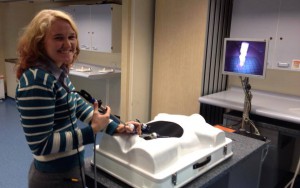April 20, 2015, by studentcontributor
Obstetrics and Gynaecology – Gross or Great?
 I’m Georgie, currently in fourth year and earlier this year, I spent 10 weeks on my obstetrics and gynaecology placement.
I’m Georgie, currently in fourth year and earlier this year, I spent 10 weeks on my obstetrics and gynaecology placement.
I particularly remember being at school and telling people I wanted to be a doctor – they would joke ‘but what if you become a gynaecologist? Ew!’. At the time, I’d often giggle along and genuinely thought I couldn’t think of anything worse!
Now having spent 10 weeks on the placement, things are totally different and in fact, it’s a career I’m really considering.
Consultants tend to specialise a little more into either obstetrics or gynaecology but to get to that point, you have to train doing both. As a med student you get to see both sides of it. What I loved most about it is the mix between medicine and surgery. I’ve always told myself I don’t want to be a surgeon, yet every time I’m in theatre, I love it. O&G seems to have a lovely balance to me.
Gynaecology
At first I thought it was going to be pretty simple as it involves one organ that only half the population have. In fact, it’s the opposite with so many different aspects included in it:
- Genito-Urinary Medicine (GUM) clinics covers all things STIs
- Contraception and Sexual Health covers pregnancy testing, emergency contraception, all methods of contraception, unplanned pregnancy counselling, specialist clinics and chylamydia testing
- Fertility clinics
- Gynaecological oncology clinics
- Colposcopy [where you go if you have an abnormal smear test at GPs]
- Urogynae – covers incontinence
- Theatre
- In-patients include early pregnancy bleeding, excess morning sickness, bleeding after giving birth, pelvic pain etc
Obstetrics
Despite enjoying gynaecology, I LOVED the obstetrics side of things. Who can’t love delivering a new life into the world?! As a medical student you get to spend a lot of time with midwives getting to see normal pregnancies and births as chances are, you probably won’t have experienced much of that before uni. The doctors get involved during the pregnancy if the pregnancy seems in any way not the average – this includes twins or triplets or if the mother or baby have been unwell during the pregnancy. Doctors also see mothers that have had to have doctor input for previous pregnancies too, even if this one is fine.
When it comes to delivering babies – doctors do the caesarean sections and also do any deliveries where extra instruments are needed to get baby out if it’s stuck or becoming unwell. It’s such an important job and the parents give the doctors the responsibility of what will become the most precious thing in the world to them. It seems a lot of pressure, but the satisfaction is massive in this field of work.
After 10 weeks of all that, I fell in love with the speciality and even ventured down to London for a Royal College of Obs & Gynae conference – this was especially for students and explained how to go about getting into the speciality and letting you practise suturing and delivering babies on plastic models.
What does this mean to you?
Firstly, you don’t need to come to university knowing what speciality you want to go into. In fact, most junior doctors don’t even know! There are plenty of opportunities at med school and in your junior doctor years to see lots of different specialities and make your mind up. Finally, never knock a speciality before you try it !


A good starting point for undergraduate doctors
Nice and very informative article. thanks for sharing it